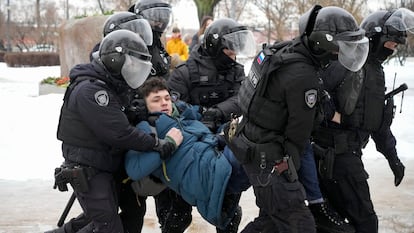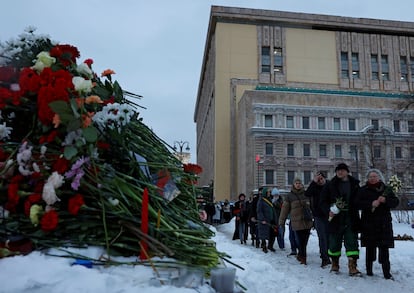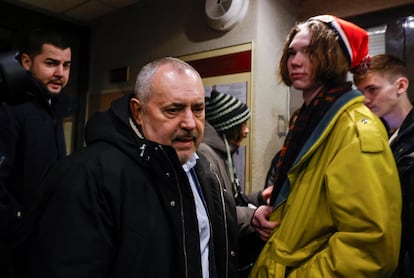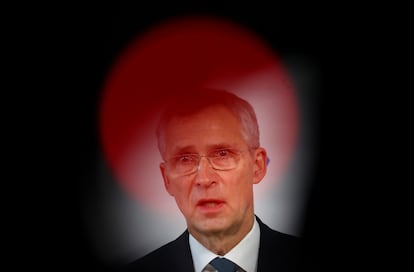With dissent struck down, Putin feels increasingly strong
The Kremlin has intensified internal repression a month before the elections, which will be held without rivals. Meanwhile, Russian forces are advancing in the war against Ukraine, while US aid falters

Russia is suffocating from repression, fear and apathy. In his bunker — both his physical one and his mental one — Vladimir Putin has executed yet another move in his favor. He feels strong. He has permanently silenced Alexei Navalny, the charismatic opponent who had challenged him to the point of returning to Russia despite the threat of ending up dead. A threat that has now been fulfilled.
Added to the disappearance of another of Putin’s enemies is the takeover by Russian troops of the Ukrainian bastion of Avdiivka — or what remains of the mining city — and the faltering of the United States, where support for Kyiv is suffering as the war is about to turn two years old. This financial and military support is also shaken by the prospect of former President Donald Trump returning to the White House. The Republican frontrunner has long railed against aid to Ukraine.
With an armor made up of strength, repression and cynicism, the head of the Kremlin is coasting towards a sixth term. A vote scheduled for next month is set to extend his time in power until 2030. He has already governed for a quarter of a century, with no rivals left. He has eliminated all opposition — the leaders are dead, imprisoned, or in exile — and he has broken the foundation of civil society networks. These could have formed a critical mass and mobilized against both the large-scale invasion of Ukraine and the deteriorating internal situation in Russia, where the economy is in permanent crisis.
In a report for the Carnegie Institute, analyst Alexander Baunov notes that the Kremlin is fighting two wars: the internal one and the external one. And Putin believes he’s winning both: the one in Ukraine — for which he is preparing another offensive in June, according to Western intelligence sources — and the one he’s carrying out against Russian citizens who are even the least bit critical of him..
Last Friday, defying the fear that corrodes everything in the Eurasian country, a few dozen people took to the streets in several cities to protest the death of Navalny, the dissident who was a thorn in Putin’s side. The activist and former political candidate had managed to mobilize thousands of Russians over the years, to protest against corruption and vote-rigging.
During the early hours of the morning, in cities such as Moscow, Yekaterinburg, Saint Petersburg and Arkhangelsk, hooded police officers erased all traces of the flowers, photographs and offerings that were left in memory of the dissident. Russian authorities have already detained over 340 people in protests across the country, which continued into the weekend. And these aren’t just considered to be unauthorized demonstrations: Navalny’s organization was declared “extremist” in 2021. Hence, having any connection with it can lead to being tried for crimes equivalent to terrorism.
“Everyone is afraid”
“The Kremlin is preparing the ground for something big after the elections,” a human rights defender tells EL PAÍS in a cafe in central Moscow, on the condition of anonymity. “Everyone is afraid,” she remarks, before bluntly adding: “We’re screwed.”
Russia is captive of both the security apparatus and a leader who is a fanatic of history. Putin has proposed returning his country to the great role as a powerful actor that it once had: he imagines ruling a state that is somewhere between tsarist Russia and the USSR in terms of strength. This means that the simple act of leaving flowers in memory of a dissident can mean ending up behind bars.
In January of 2021, when Navalny returned to Moscow from Germany, where he recovered from the very serious poison attack perpetrated against him by Russian security agents in Siberia, hundreds of people were waiting for him at the airport. He was arrested upon disembarking and never set foot on the street again. His arrest, harshly criticized by the West, led to large protests that winter in almost all of Russia..

Today, many of those who took to the streets back then don’t dare to do so again. Others are already outside the country. According to the Ministry of Defense, 1.3 million people left Russia between 2022 and 2023, although many have returned. According to the research group Exodus-22, a third of those who left after military mobilization was announced back in September of 2022 intended to return or have already done so.
Anastasiya was one of those who went to receive Navalny at Vnukovo International Airport.
“Alexei Navalny was the embodiment of a thriving Russia where there’s room for choice and truth. I don’t think that with his cynical murder the hope for a better future has disappeared. Hope already disappeared before, when Russia attacked Ukraine and the Russian people turned a blind eye,” she laments.
Protesting in Russia has a very high cost. Since the invasion of Ukraine on February 24, 2022, at least 20,000 people have been arrested for the act, according to the anti-political repression organization OVD–Info. Putin, a former KGB spy who has relied on former colleagues to make up his inner circle, came to power on December 31, 1999. And since then, his successive governments have gradually approved numerous repressive laws that multiplied after the World Cup that Russia hosted in the summer of 2018. Since then, the harassment of all types of organizations — from entities in defense of the environment to associations for women’s rights –— and the political persecution of all rivals have been constants.
Over the last two years, the Russian authorities — in a practice reminiscent of the Soviet era — have used various labels, from “foreign agent” to “enemy of the people,” to smear any citizen as being “under foreign influence.” Furthermore, at the beginning of the war, the State Duma, Russia’s federal legislative body, passed another law to punish anyone who “discredits” the actions of the Army or the country’s president with prison time. According to the OVD-Info portal, Russian authorities have opened 883 criminal cases against dissidents who have expressed their opposition to the invasion of Ukraine.
But large-scale war protests haven’t been numerous in a country devoured by apathy, where a tacit agreement has prevailed between the Russians and the Kremlin, in which Putin has carte blanche so long as the conflict doesn’t affect the population. Most of the citizenry feeds on the menu of propaganda poured out by state TV channels, in which the clamor against the “collective West” and against the degradation of “traditional values” is constant.
No one is free from arrest for any reason. In Saint Petersburg, Bishop Grigori Mijnov-Vaitenko, recognized for directing one of the largest aid networks for refugees fleeing war, was arrested on Saturday, February 17, for announcing on his Telegram channel that he was going to officiate a mass for Navalny.
The pervasive fear and lack of public protests has become particularly evident this year, in which the effects of Western sanctions on Russia have multiplied. Hundreds of thousands of Russians were left without heat or light in one of the harshest winters in years. Yet there wasn’t a single demonstration.
“Putin tries to show that he’s in a strong position, but behind that facade, there’s enormous distrust of everything,” reflects a veteran Western diplomat, who knows Russia well. She believes that what has happened to Navalny — whether he was directly murdered by the authorities or died as a result of the harsh living conditions in prison — is a symptom of Putin’s insecurity. The Kremlin isn’t even able to ignore the small protests that have been organized following the activist’s death.
It was rumored that Navalny’s name was included on a list of possible assets to exchange with the EU and the US. “The head of the Kremlin didn’t want him loose,” the diplomat affirms. “[Putin] is terrified that the opposition will get organized abroad. It’s not the case right now, but it could happen.”
Tatiana Stanovaya isn’t of the same opinion. This analyst believes that Putin wasn’t afraid of Navalny — rather, she thinks that he just treated him with contempt. But his tragic story — his return to Russia, his arrest and his disappearance — will have severe consequences for the country. Navalny’s death represents “the total defeat of the non-systemic opposition.” Navalny’s party, Russia of the Future, has no tolerance for the Communist Party or the ultranationalist Liberal Democratic Party, blocs within the State Duma that tacitly support Putin’s United Russia Party. This “systemic opposition” offers an illusion to cover up the fact that the country is actually an autocracy.
A vote for the leader’s glory
The vote that will be held between March 15 and 17 is designed to boost Putin’s glory. The 71-year old Russian leader has changed the electoral law to be able to run again and surpass Stalin’s total time in power. Boris Nadezhdin, who ran as a presidential candidate in favor of peace with Ukraine and collected some 200,000 signatures of support, won’t appear on the ballot. On February 8, the Central Election Commission rejected his registration..

On Friday, February 16, after the announcement of Navalny’s death, the police raided the house of one of Nadezhdin’s campaign managers. For the unnamed human rights defender consulted by EL PAÍS, this raid has raised many concerns. She explains her fear that everything was merely an “operation” orchestrated by the Federal Security Service (FSB) to uncover dissent. “If it’s a maneuver, it’s certainly the best one yet,” the woman shrugs.
Some Russians thought the Kremlin had murdered Navalny all the way back in December, when he disappeared for three weeks during his transfer to the remote penal colony that reported his death on Friday. The dissident’s death, announced a week before Putin’s annual speech to the State Duma and a month before the presidential vote, has been even more shocking.
The Russian president will be addressing legislators as his soldiers have conquered the Ukrainian city of Avdiivka, in the Donetsk province. The West is in a renewed position of alarm over the Russian threat. NATO hasn’t changed its alert level, but several NATO allies believe that the Kremlin may seek to test the West’s mutual security commitment in the coming decade. Additionally, last week, the White House confirmed that Russia has a “concerning” but “not yet active” new anti-satellite weapon.
The second anniversary of the large-scale invasion of Ukraine, which Putin justified with the supposed protection of Russian-speaking populations and presented as a “special operation” to “denazify” Ukraine, comes at a difficult time for Kyiv and for the wider West.
Ukraine is a candidate for EU membership; many European leaders have assured their populations that Ukrainian soldiers and citizens are fighting a war for shared values and for the EU. Several member states have promised to support Ukraine “for as long as necessary.” However, it’s becoming increasingly difficult to validate that support and pressure Putin.
The West has reacted with verbal forcefulness to Navalny’s death. But for now, it hasn’t gone beyond that. Guy Verhofstadt, a member of the European Parliament and the former Belgian prime minister, is demanding more sanctions, which would involve freezing additional Russian assets and putting a ban on more members of Putin’s government being able to enter EU territory. Because of what happened to Navalny, he’s asking that an extraordinary meeting of the European Council be convened. Verhofstadt wants the leaders of the 27 member states to approve “war bonds” for Ukraine, along with more policies to form a “proper common European defence union.”
“A perfect storm is heating up between an imperial Moscow, an ill-prepared and poorly led Europe going to the polls and an impressionable U.S. public opinion driven by unhinged, Putin-loving so-called ‘Republicans,’” the liberal politician posted on his social media this past Saturday.
The EU has imposed 12 packages of sanctions on Russia and is currently debating a 13th to try to stifle the Kremlin’s war machine. But while announcements of more support for Kyiv are being made, including a new NATO training center for Ukrainian troops and a coalition to send drones, soldiers on the frontlines are facing a shortage of ammunition and are demanding more sophisticated weapons.
On February 1, the EU approved a financial lifeline for Ukraine worth €50 billion ($54 billion) to keep the country afloat. However, the proposed U.S. package of $60 billion is currently on hold due to opposition from a segment of the Republican Party in the House of Representatives. NATO Secretary General Jens Stoltenberg says that this delay is already having an impact on Ukraine.

Europe blames supply delays on the limited capacity of its defense industry, but more and more voices are doubting the depth of the commitment. Many warn that the EU isn’t aware of the consequences that await the West in the event of a hypothetical Ukrainian defeat. Meanwhile, Ukrainian soldiers, amidst fierce fighting, emphasize that while the material they’re receiving from the West is enough for them to resist, it’s not enough for them to be able to win.
Meanwhile, Russia is increasing its weapons production. Putin visited the country’s largest tank factory on Thursday, the Uralvagonzavod plant, a subsidiary of the state arms giant Rostec. There, next to the Ural Mountains, he toured the facilities that are producing T-72 and T-90 tanks, which will soon be deployed in the Russian offensive against Ukraine. He highlighted how the Kremlin has prepared for a long war by quintupling its production of tanks over the next year-and-a-half.
However, he still fears that his house of cards will collapse on the weakest side: the frontlines. The wives of some drafted men recently held protests, demanding that they return home. Some of these women were interrogated by Russian security services. But the Kremlin knows that harming soldiers’ wives can have repercussions on the frontlines, where the military is already fed up with how city people live, hosting racy parties as if the war were far away from them. Hence, unable to forcibly break up the women’s protests, the Kremlin opted to arrest the journalists covering them.
Putin learned an important lesson from the failed coup attempt by the owner of the Wagner Group, Yevgeny Prigozhin, in June of 2023. The head of the mercenaries, who exposed the weakness of the Russian regime at a key moment in the Ukrainian counteroffensive (which ultimately failed), died in September when his plane crashed. He had trusted that a presidential pardon would save him.
Putin, given his own career in espionage, has always distrusted the army. His defense minister, General Sergei Shoigu, isn’t a career military man, but rather a politician loyal to the president. And, after purging the military leadership and the Wagner Group, Putin’s repression extended beyond pro-democracy advocates to include several visible heads of the ultranationalist sector.
The silencing of Navalny has left fear in the wake of his legacy. “Now, emotions can play a role,” says analyst Stanovaya. Navalny’s mother received official notification of his death this past Saturday. With her hands hiding her face, and accompanied by one of the opposition’s lawyers, the woman arrived at IK-3 prison, in the Arctic Circle, to try to clarify what had happened to her son. The family, however, hasn’t been able to see the body. They now face a new fight to recover it. Not even in death does the Kremlin leave Navalny alone.
Sign up for our weekly newsletter to get more English-language news coverage from EL PAÍS USA Edition
Tu suscripción se está usando en otro dispositivo
¿Quieres añadir otro usuario a tu suscripción?
Si continúas leyendo en este dispositivo, no se podrá leer en el otro.
FlechaTu suscripción se está usando en otro dispositivo y solo puedes acceder a EL PAÍS desde un dispositivo a la vez.
Si quieres compartir tu cuenta, cambia tu suscripción a la modalidad Premium, así podrás añadir otro usuario. Cada uno accederá con su propia cuenta de email, lo que os permitirá personalizar vuestra experiencia en EL PAÍS.
¿Tienes una suscripción de empresa? Accede aquí para contratar más cuentas.
En el caso de no saber quién está usando tu cuenta, te recomendamos cambiar tu contraseña aquí.
Si decides continuar compartiendo tu cuenta, este mensaje se mostrará en tu dispositivo y en el de la otra persona que está usando tu cuenta de forma indefinida, afectando a tu experiencia de lectura. Puedes consultar aquí los términos y condiciones de la suscripción digital.








































